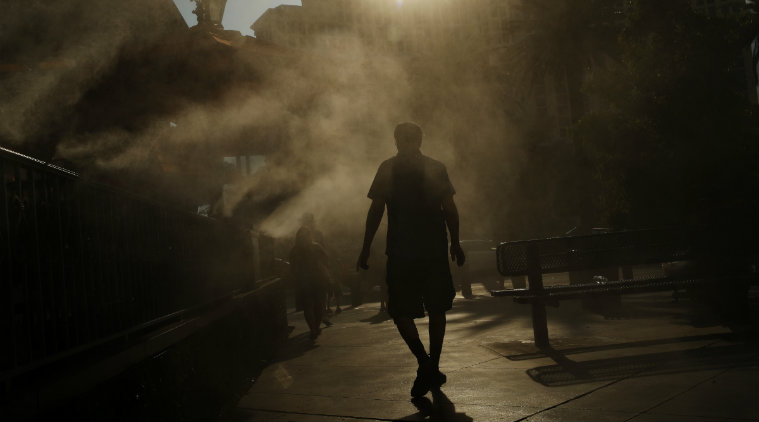
Written by Coral Davenport
President Donald Trump is preparing to establish a panel to examine whether climate change affects national security, despite reports from his own government showing that human-caused global warming is a growing threat to the nation’s economy, health and security.
According to a White House memo dated February 14, Trump’s staff members have drafted an executive order to create a 12-member committee, which will include a White House adviser, Dr. William Happer, whose views are sharply at odds with the established scientific consensus that carbon dioxide pollution is dangerous for the planet. The memo attempts to cast doubt on multiple scientific and defense reports that have already concluded climate change poses a significant threat to national security.
The efforts to establish the panel appears to be the latest step by the Trump administration to play down or distort the established scientific consensus on the effect of climate change, as Trump rolls back Obama-era climate change regulations on planet-warming pollution from vehicle tailpipes and power plants. It also appears to be the latest example of Trump ignoring the findings and recommendations of his own intelligence and defense officials.
At least to some extent, the matter may not entirely be in Trump’s control. Congress added language to the annual Defense policy bill it passed with bipartisan support in late 2017 stating that climate change “is a direct threat to the national security of the United States and is impacting stability in areas of the world both where the United States Armed Forces are operating today, and where strategic implications for future conflict exist.” The bill, which Trump signed into law, specifically required the Pentagon to produce a report on climate change’s effect on military installations and encouraged department leaders to consider the effects of climate change when planning for current and future missions. The report was released last month.
Critics of the effort to create the new panel pointed to the inclusion of Happer, a Princeton physicist who serves on the White House National Security Council as Trump’s deputy assistant for emerging technologies. Happer has gained notoriety in the scientific community for his statements that carbon dioxide — the greenhouse gas that scientists say is trapping heat and warming the planet — is beneficial to humanity.
A spokesman for the National Security Council, which is leading the panel’s formation, declined to comment on the record.

The memo, which was first reported by The Washington Post, cast doubt on the multiple scientific and defense reports concluding that climate change poses a significant threat to national security, saying the reports “have not undergone a rigorous independent and adversarial peer review to examine the certainties and uncertainties of climate science, as well as implications for national security.”
Scientists defended the research. “The link between climate science and national security has been closely studied for over a decade at the highest levels of the U.S. government — by scientists, the Defense Department and intelligence agencies, and all those studies have made a strong case that various aspects of climate change have an effect on national security,” said Dr. Michael Oppenheimer, a professor of geosciences and international affairs at Princeton.
Sen. Angus King, I-Maine, a member of the Senate Intelligence Committee, said the proposal to create the panel appeared to be part of a broader and now familiar pattern of Trump and his allies in the White House to undercut experts across the government they view as hindering their objectives.
“What you are signaling to the intelligence community is, in this case, don’t tell me things I don’t want to hear,” King said. “One of the great dangers of intelligence, if you look back over our history, is when intelligence is skewed in order to meet the biases of the policymaker.”
Of Happer’s participation on the panel, King said, “There is no pretense to objectivity or scientific rigor.”
In 2015, Happer was called to testify before a Senate committee after environmental group Greenpeace revealed that he agreed to write a scientific paper at the request of an unnamed oil and gas company in the Middle East.
In his email exchanges with Greenpeace, Happer wrote, “More CO2 will benefit the world. The only way to limit CO2 would be to stop using fossil fuels, which I think would be a profoundly immoral and irrational policy.”
Happer suggested to the purported funders that he not be paid directly. “My activities to push back against climate extremism are a labor of love,” he wrote.
In casting doubt on the established science of climate change and the multiple studies linking climate change and national security, the memo highlights several reports, including this month’s 2019 Worldwide Threat Assessment, released by the director of national intelligence, which concluded that climate change and other environmental degradation are “likely to fuel competition for resources, economic distress, and social discontent through 2019 and beyond. Climate hazards such as extreme weather, higher temperatures, droughts, floods, wildfires, storms, sea level rise, soil degradation, and acidifying oceans are intensifying, threatening infrastructure, health, and water and food security.”
That report listed specific threats posed by climate change, such as the threat of rising sea levels to the safety of low-lying military installations and the likelihood that increased drought and flooding could lead to mass human displacement and increased conflict. The report concluded that climate-driven food shortages could increase “the risk of social unrest, migration, and interstate tension in countries such as Egypt, Ethiopia, Iraq and Jordan.”
Rep. Adam Smith, D-Wash., chairman of the House Armed Services Committee, called the creation of the panel part of Trump’s “rejection of reality” and warned that it could disrupt important national security planning across the globe.
“At every turn here they have tried to basically bury the science behind climate change,” Smith said. “It is simply not debatable from a scientific standpoint. Climate change will lead to instability in parts of the world that are fairly predictable.”
The White House memo also casts doubt on the underlying science of the National Climate Assessment, a two-part report, issued in 2017 and 2018, which is the largest and most comprehensive scientific report on the effect of climate change to date in the United States.
Taken together, the reports document conclusive evidence that the burning of fossil fuels is heating the atmosphere, leading to record wildfires in California, crop failures in the Midwest and crumbling infrastructure in the South. The reports also note that as climate change brings an increase in sea level rise, extreme weather and drought, it can lead to increased damage to military installations.
The peer-reviewed reports, researched over several years, were published by more than 13 federal agencies alongside dozens of academic researchers. Oppenheimer scoffed at the White House contention that the reports have not gone undergone rigorous peer review.
“They underwent a total scrub down by peer review,” he said.
In addition to those reports, the Pentagon has commissioned and funded ongoing scientific research on the effect of climate change and sea-level rise, in order to plan for the effects on low-lying military installations.
One of those reports, published last February, titled “The Impact of Sea-Level Rise and Climate Change on Department of Defense Installations on Atolls in the Pacific Ocean,” details numerous effects that rising seas have on military bases.
For example, the report concludes that a string of South Pacific islands that is home to the Ronald Reagan Ballistic Missile Defense Test Site, which operates space weapons programs and tracks NASA research, could be uninhabitable by as soon as 2035 because of rising sea levels.
That Pentagon-funded research comes after more than a decade of major military and scientific studies, dating back to the George W. Bush administration, that links climate change to national security threats.
A 2014 Pentagon report asserted decisively that climate change poses an immediate threat to national security, with increased risks from terrorism, infectious disease, global poverty and food shortages. It also predicted rising demand for military disaster responses as extreme weather creates more global humanitarian crises. That same year, the Pentagon’s Quadrennial Defense Review, the agency’s main public document describing the current doctrine of the U.S. military, drew a direct link between the effects of global warming — like rising sea levels and extreme weather patterns — and terrorism.